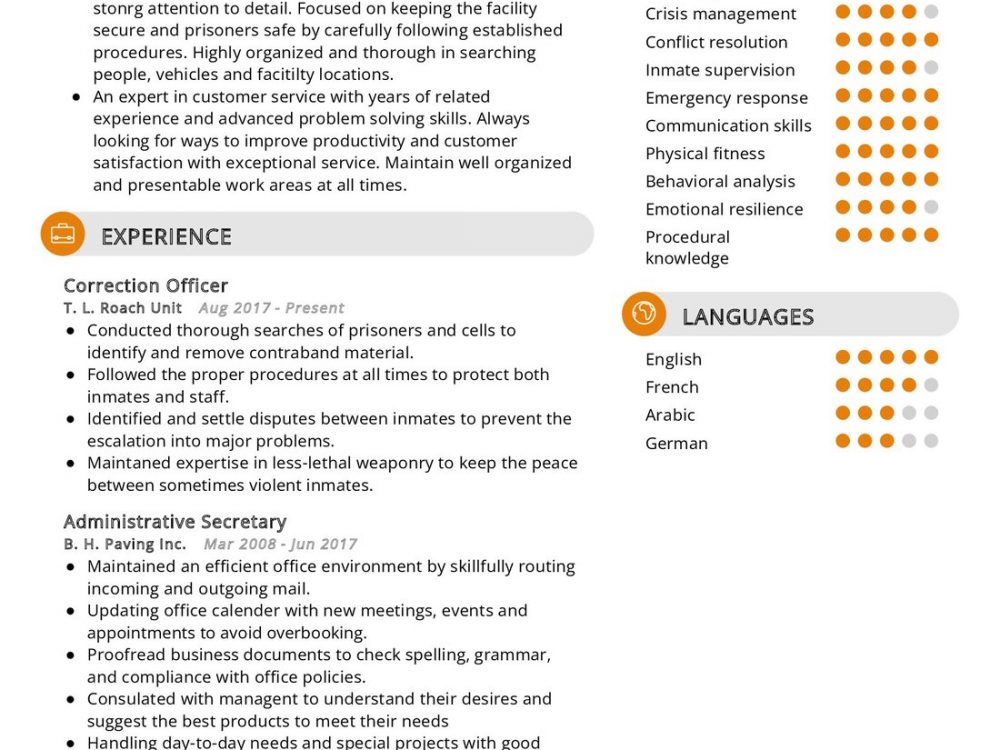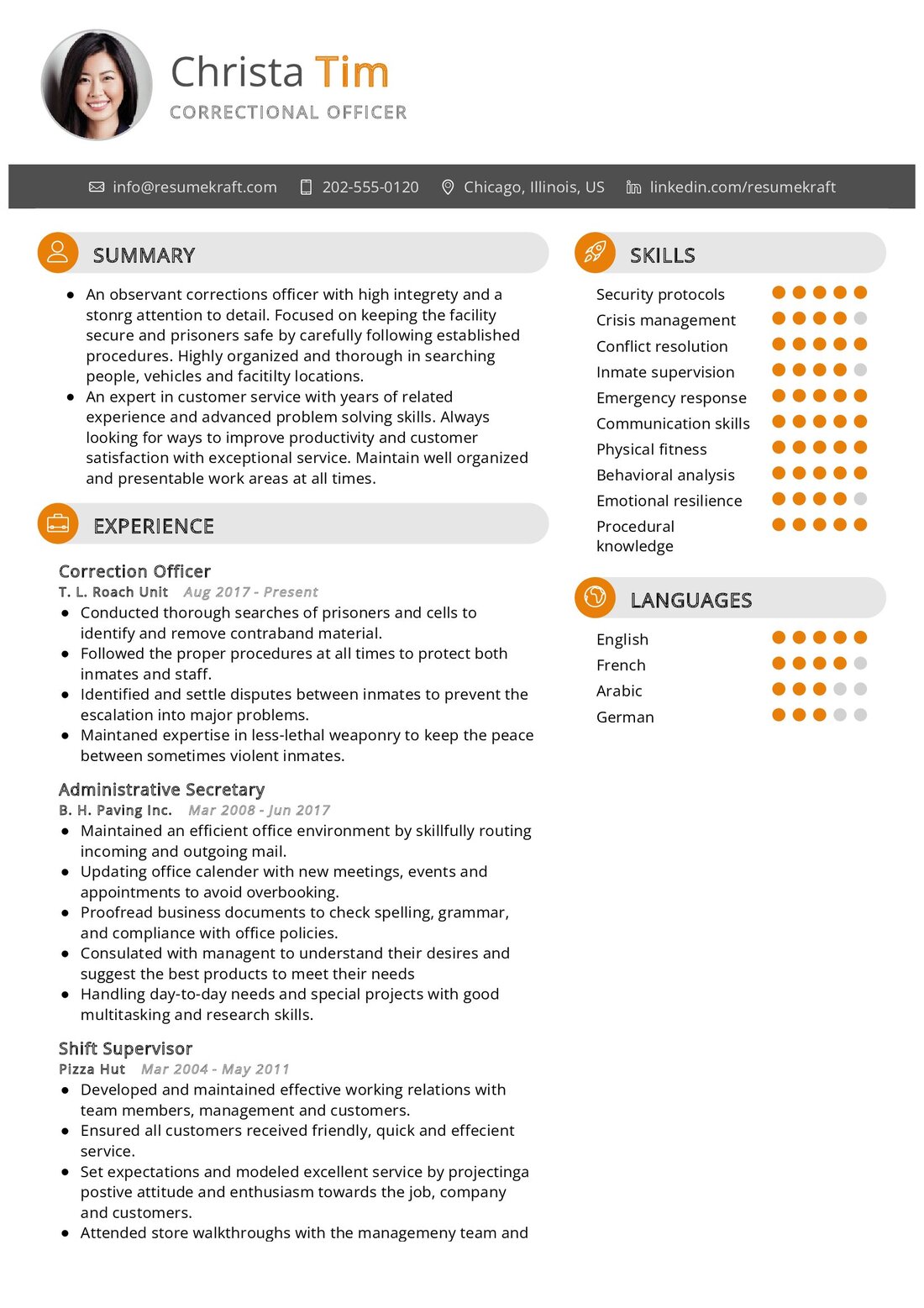What is the Role of a Correctional Officer?
As the guardians of order and safety within correctional facilities, the role of a Correctional Officer is of paramount importance in the criminal justice system. These dedicated professionals play a pivotal role in maintaining security, overseeing inmate rehabilitation, and upholding the rule of law. In this comprehensive guide, we will delve into the multifaceted role of a Correctional Officer, a position that demands a unique blend of skills, resilience, and a commitment to public safety.
A Correctional Officer is tasked with the responsibility of ensuring the safety and security of inmates, staff, and visitors within correctional facilities. They are the first line of defense against potential security threats, and their role extends beyond traditional law enforcement duties. Correctional Officers also play a vital role in inmate rehabilitation, working to reduce recidivism and prepare individuals for successful reintegration into society. This article will explore the key aspects of a Correctional Officer’s role, the qualifications required, and the skills essential for success in this demanding profession.
What are the Correctional Officer Job Requirements?
Embarking on a career as a Correctional Officer entails meeting specific job requirements designed to ensure that individuals in this role possess the necessary skills and attributes. The path to becoming a Correctional Officer is rigorous but rewarding, as it equips individuals to serve effectively in the correctional system. Let’s take a closer look at the prerequisites one needs to fulfill to embrace the role of a Correctional Officer:
- A high school diploma or equivalent, showcasing a foundational level of education.
- Successful completion of a comprehensive training program at a recognized correctional academy.
- Physical fitness and agility, as the role often involves strenuous activities and the need to respond quickly to emergencies.
- Strong communication and interpersonal skills, vital for interacting with inmates, colleagues, and visitors.
- Sound judgment and the ability to make quick decisions in high-pressure situations.
- Passing a background check and drug screening to ensure suitability for the role.
It’s important to note that while formal education requirements may be modest, the training and qualifications for a Correctional Officer are designed to prepare individuals for the unique challenges of the job.
What are the Responsibilities of a Correctional Officer?
The role of a Correctional Officer is a tapestry of varied responsibilities, each thread contributing to the safety and rehabilitation of inmates within the correctional system. Let’s unravel the core responsibilities that define this role, each task requiring a combination of skill, vigilance, and a commitment to upholding justice:
- Security and Safety: Ensuring the safety and security of inmates, staff, and visitors through regular patrols, inspections, and the use of surveillance equipment.
- Inmate Supervision: Monitoring inmate activities, enforcing facility rules, and addressing any rule violations or disturbances promptly.
- Search and Contraband Control: Conducting searches for contraband items, such as drugs or weapons, to maintain a contraband-free environment.
- Rehabilitation Programs: Assisting in the implementation of rehabilitation programs aimed at reducing recidivism and preparing inmates for reintegration into society.
- Crisis Management: Responding to emergencies, including fights, medical incidents, and escapes, with composure and professionalism.
- Documentation and Reporting: Maintaining accurate records of inmate behavior, incidents, and facility activities to ensure accountability and transparency.
- Conflict Resolution: Using communication and de-escalation techniques to resolve conflicts among inmates and diffuse potentially volatile situations.
Each responsibility comes with its own set of challenges and learning, shaping Correctional Officers into professionals capable of maintaining order in a complex environment.
Correctional Officer Resume Writing Tips
Crafting a compelling resume as a Correctional Officer is crucial for standing out in a competitive job market. Your resume should effectively communicate your qualifications, skills, and dedication to this challenging profession. Here are some tips to help you create a resume that highlights your suitability for the role:
- Emphasize your training and qualifications, showcasing your successful completion of a recognized correctional academy program.
- Highlight your physical fitness and agility, underscoring your readiness for the physical demands of the job.
- Showcase your communication and interpersonal skills, as these are essential for effective inmate interaction.
- Detail any experience or specialized training in crisis management and conflict resolution.
- Include any relevant certifications, such as first aid or CPR, that demonstrate your commitment to safety and emergency response.
- Personalize your resume for the specific role you are applying for, aligning your qualifications with the job description.
Your resume is your first opportunity to make a strong impression, so make sure it effectively conveys your qualifications and commitment to the role of a Correctional Officer.
Correctional Officer Resume Summary Examples
Your resume summary serves as an introduction to your career story, offering a snapshot of your qualifications and the value you bring as a Correctional Officer. Here are some examples to inspire your resume summary:
- “Dedicated Correctional Officer with comprehensive training and a commitment to maintaining safety and security within correctional facilities.”
- “Experienced Correctional Officer with a strong track record in crisis management and conflict resolution, ensuring the well-being of inmates and staff.”
- “Detail-oriented Correctional Officer with a focus on rehabilitation programs, working to reduce recidivism and promote positive inmate outcomes.”
Your resume summary should be concise yet impactful, leaving a strong impression on potential employers.
Create a Strong Experience Section for Your Correctional Officer Resume
Your experience section is the heart of your resume, where you narrate your career journey and highlight your achievements in the field of corrections. Here are some examples to guide you in creating a compelling experience section:
- “Served as a Correctional Officer at [Correctional Facility Name], where I maintained security, supervised inmates, and successfully resolved conflicts, contributing to a safe and orderly environment.”
- “Led rehabilitation programs aimed at inmate education and skill development, resulting in a [percentage] reduction in recidivism rates.”
- “Responded to emergencies with professionalism and composure, ensuring the safety of all facility occupants during critical incidents.”
Each experience listed should provide specific details of your responsibilities and accomplishments, showcasing your contributions to the field of corrections.
Sample Education Section for Your Correctional Officer Resume
Your educational background is a critical part of your resume, as it demonstrates your foundational knowledge and commitment to the profession. Here’s how you can list your educational milestones:
Each educational qualification reflects your dedication to obtaining the necessary knowledge and training for a successful career as a Correctional Officer.
Correctional Officer Skills for Your Resume
Your skill set as a Correctional Officer is a toolbox equipped with a diverse range of tools that you have honed over the years. These skills are essential for maintaining safety and security within correctional facilities. Let’s list down the essential skills that a Correctional Officer should possess:
Soft Skills:
- Effective Communication: The ability to communicate clearly and assertively with inmates, colleagues, and superiors.
- Conflict Resolution: Skill in de-escalating tense situations and resolving conflicts among inmates.
- Observation and Vigilance: Keen attention to detail and the ability to detect signs of potential security threats.
- Empathy and Patience: The capacity to understand and work with inmates as they progress through rehabilitation programs.
- Adaptability: The flexibility to respond to evolving situations and changing inmate populations.
Hard Skills:
- Physical Fitness: Maintaining a high level of physical fitness to perform tasks such as patrolling, searching, and responding to emergencies.
- Crisis Management: The ability to remain calm and take effective action during critical incidents.
- Security Procedures: Knowledge of facility security protocols and procedures to maintain order and safety.
- Report Writing: The skill to accurately document incidents and activities within the facility.
- First Aid and CPR: Training in providing emergency medical care when needed.
Each skill is a tool in your arsenal, helping you maintain security and safety within the correctional system.
Common Mistakes to Avoid When Writing a Correctional Officer Resume
While crafting your resume, it’s essential to steer clear of common pitfalls that can hinder your job search. Avoiding these mistakes will help you create a resume that effectively communicates your qualifications:
- Using Generic Language: Avoid using overly generic language in your resume; instead, use specific examples and quantifiable achievements.
- Neglecting Training and Certifications: Don’t overlook the importance of showcasing your training and certifications, as they are crucial for this role.
- Omitting Soft Skills: Soft skills such as communication and conflict resolution are just as important as hard skills; make sure to highlight them.
- Ignoring Tailoring: Tailor your resume for each job application to align with the specific requirements of the position.
- Forgetting to Proofread: Typos and grammatical errors can detract from your professionalism, so proofread your resume carefully.
Avoiding these mistakes will help ensure that your resume effectively represents you as a qualified Correctional Officer.
Key Takeaways for Your Correctional Officer Resume
As we conclude this comprehensive guide, let’s recap the key takeaways to keep in mind while crafting your Correctional Officer resume:
- Highlight your training and qualifications, emphasizing your readiness for the role.
- Showcase your skills in communication, conflict resolution, and observation.
- Detail your experience, focusing on your contributions to safety and rehabilitation within correctional facilities.
- Include relevant certifications and training that demonstrate your commitment to the profession.
Your resume is your ticket to a rewarding career in corrections, so make sure it effectively communicates your qualifications and dedication to maintaining safety and security.
Finally, feel free to utilize resources like AI Resume Builder, Resume Design, Resume Samples, Resume Examples, Resume Skills, Resume Help, Resume Synonyms, and Job Responsibilities to create a standout application and prepare for the Correctional Officer job interview.


